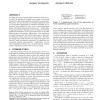53 search results - page 3 / 11 » A Polynomial-time Nash Equilibrium Algorithm for Repeated St... |
ICML
1998
IEEE
14 years 8 months ago
1998
IEEE
In this paper, we adopt general-sum stochastic games as a framework for multiagent reinforcement learning. Our work extends previous work by Littman on zero-sum stochastic games t...
SIGECOM
2010
ACM
13 years 7 months ago
2010
ACM
Cut games and party affiliation games are well-known classes of potential games. Schaffer and Yannakakis showed that computing pure Nash equilibrium in these games is PLScomplete....
IJCAI
2001
13 years 9 months ago
2001
R-max is a very simple model-based reinforcement learning algorithm which can attain near-optimal average reward in polynomial time. In R-max, the agent always maintains a complet...
ATAL
2008
Springer
13 years 9 months ago
2008
Springer
We define the class of games called simulation-based games, in which the payoffs are available as an output of an oracle (simulator), rather than specified analytically or using a...
ATAL
2010
Springer
13 years 8 months ago
2010
Springer
Planning how to interact against bounded memory and unbounded memory learning opponents needs different treatment. Thus far, however, work in this area has shown how to design pla...

